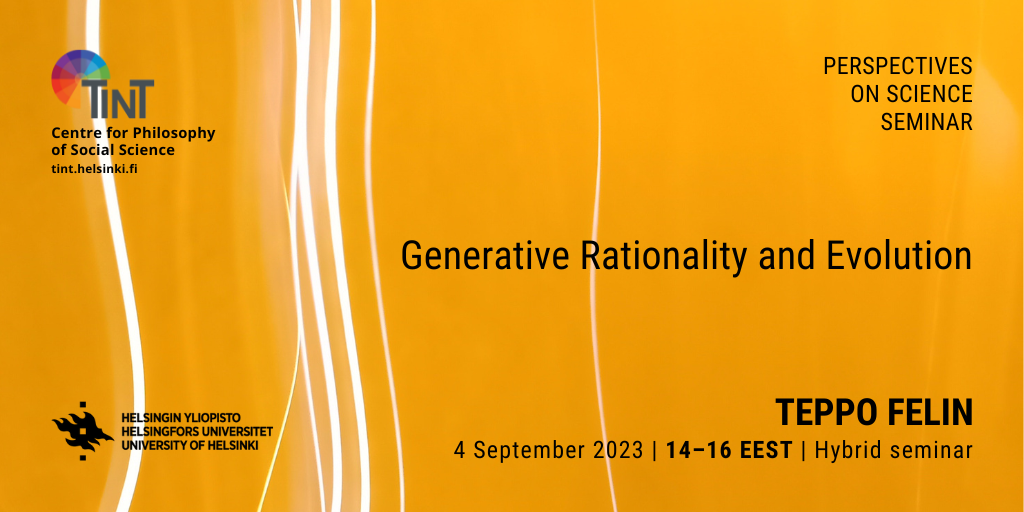
In the next Perspectives on Science seminar, Teppo Felin (Utah State University) will give a talk on “Generative Rationality and Evolution“.
The seminar takes place in hybrid format in person and online via Zoom from 14:15 to 15:45 on Monday the 4th of September 2023. To join the seminar, please contact jessica.north@helsinki.fi for the location or Zoom invitation.
Perspectives on Science is a weekly research seminar which brings together experts from science studies and philosophy of science. It is organized by TINT – Centre for Philosophy of Social Science at the University of Helsinki. More information about the seminar here.
Abstract:
Human reasoning and rationality have for decades been defined in computational, statistical and psychophysical terms across the sciences—particularly in evolutionary psychology and the literatures on ecological and bounded rationality. Building on past work with co-authors (including Jan Koenderink, Stuart Kauffman, Todd Zenger), I offer an alternative, “generative” conception of rationality. In the talk, I first discuss the limitations with the computational and psychophysical approach, highlighting popular experiments from the literature. Thereafter, I discuss how generative rationality solves central problems like the cue-to-clue transformation and the origins of novelty. The generative view of rationality contrasts with computational and bounded views on a number of dimensions: it is forward-looking rather than backward-looking, it focuses on perceptual presentation rather than representation, it is embodied rather than computational, and so forth. I argue that human judgment and rationality are better characterized as a form of quasi-scientific hypothesizing and problem solving. In conclusion, I discuss the interdisciplinary implications of generative rationality for our understanding of evolution and the central questions in fields such as economics, psychology, and cognitive science.
Relevant background articles:
Teppo Felin & Jan Koenderink (2022). A Generative View of Rationality and Growing Awareness. Frontiers in Psychology.
Teppo Felin & Stuart Kauffman (2023). The Adjacent Possible: Harnessing Functional Excess, Experimentation and Protoscience as Tool. Industrial and Corporate Change.
Nick Chater, Teppo Felin, David Funder, Gerd Gigerenzer, Jan Koenderink, Joachim Krueger, Denis Noble, Samuel Nordli, Mike Oaksford, Barry Schwartz, Keith Stanovich & Peter Todd (2018). Mind, Rationality, and Cognition: An Interdisciplinary Debate. Psychonomic Bulletin and Review.
Author bio:
Teppo Felin is the Douglas D Anderson Endowed Professor at the Huntsman School of Business, Utah State University. From 2013-2021, Felin was Professor of Strategy at Saïd Business School, University of Oxford, and Academic Director of the Oxford Diploma in Strategy and Innovation. His research interests include cognition, bounded rationality, evolution, cognitive systems, economics, organization design, and strategy. His research has been published in journals such as Organization Science, Strategy Science, Research Policy, Strategic Management Journal, and MIT Sloan Management Review. He has also published articles across disciplines, including journals such as Psychonomic Bulletin and Review, Perception, Erkenntnis, PLOS ONE, and Genome Biology. Felin is especially interested in interdisciplinary approaches to evolution, cognition, organization, and the origins of novelty.









